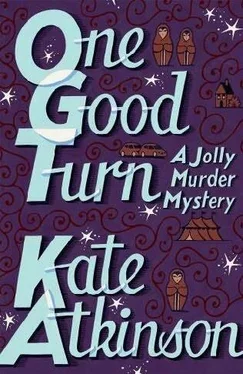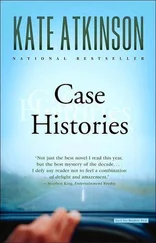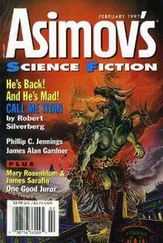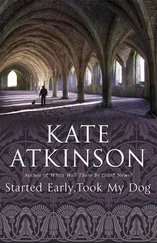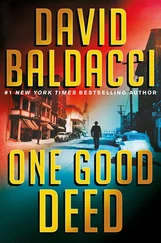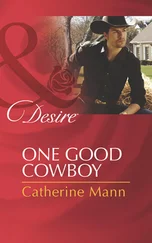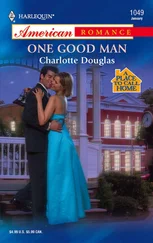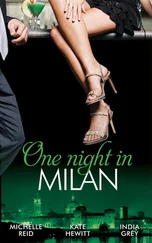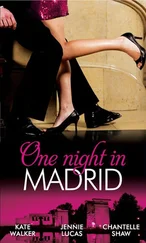Kate Atkinson - One Good Turn
Здесь есть возможность читать онлайн «Kate Atkinson - One Good Turn» весь текст электронной книги совершенно бесплатно (целиком полную версию без сокращений). В некоторых случаях можно слушать аудио, скачать через торрент в формате fb2 и присутствует краткое содержание. Жанр: Триллер, на английском языке. Описание произведения, (предисловие) а так же отзывы посетителей доступны на портале библиотеки ЛибКат.
- Название:One Good Turn
- Автор:
- Жанр:
- Год:неизвестен
- ISBN:нет данных
- Рейтинг книги:4 / 5. Голосов: 2
-
Избранное:Добавить в избранное
- Отзывы:
-
Ваша оценка:
- 80
- 1
- 2
- 3
- 4
- 5
One Good Turn: краткое содержание, описание и аннотация
Предлагаем к чтению аннотацию, описание, краткое содержание или предисловие (зависит от того, что написал сам автор книги «One Good Turn»). Если вы не нашли необходимую информацию о книге — напишите в комментариях, мы постараемся отыскать её.
One Good Turn — читать онлайн бесплатно полную книгу (весь текст) целиком
Ниже представлен текст книги, разбитый по страницам. Система сохранения места последней прочитанной страницы, позволяет с удобством читать онлайн бесплатно книгу «One Good Turn», без необходимости каждый раз заново искать на чём Вы остановились. Поставьте закладку, и сможете в любой момент перейти на страницу, на которой закончили чтение.
Интервал:
Закладка:
Martin wondered if it was really his meanderings that had brought him to the chapel. Wasn’t it because he knew it would be the least busy place in the hospital? Hadn’t temptation lured him like something vaguely obscene so that he could look in the holdall? Wasn’t knowledge the reward of temptation? Eve, Adam’s disobedient wife, knew that. So did Bluebeard’s disobedient wife, nameless like Martin’s own imaginary spouse.
He was dissembling. Didn’t he know better? He had been tempted in St. Petersburg, and look what had happened. Knowledge was not necessarily a good thing. Go ask Eve. It was wrong to look in the bag, there was no way round that fact, it was a moral absolute, yet once the idea had lodged itself in his mind, it wouldn’t go away. He had a bond with Paul Bradley, he had saved his life, for all he knew it might be the best thing he was fated to do in his own life. Didn’t that bond give him permission to know more? You could find your way round temptation, you could say no, I’m not going to go behind the wooden door and buy a Lyudmila or a Svetlana, but then you end up picking up a girl at a matryoshka stall. “You’re a weak-willed, lily-livered little pansy, Martin.” Flowery language from his father, on the occasion of what? He couldn’t remember, probably when he left the army cadets because he couldn’t complete the assault course. A girl named Irina who had the palest skin, who called him Marty.
Of course, it could be a story about a man like Martin, a man to whom nothing ever happens. The Man to Whom Nothing Happened . How he got unexpectedly caught up in someone else’s life, how he discovered something in a bag that changed his world forever. It was a lie, he lied to himself. All the time. Something had happened to him. Once. The incident . The girl from the matryoshka stall happened. Once. But once was enough.
The chapel was deserted. He checked this fact several times. This was how he would feel if he was about to masturbate in public-not that he would ever do that. The horror of being caught! Then, casually, as if it were his own bag that he needed something from, pulling on the zipper and peeling the bag open. A toiletry bag, a change of underwear, and a box, that was all. The box was unremarkable and black, like the holdall, but made of some rigid plastic material, pitted like an orange peel and with steel clasps. That was that, then. He had seen inside the bag and there was nothing that revealed anything about Paul Bradley, just a black plastic box, a mystery within a mystery. Perhaps the box would contain another box, and inside that box another box, and so on, like the Russian dolls. Like his own Russian dolls, the prelude to his brief courtship and consummation with the girl from the matryoshka stall. Wasn’t that a lesson? A lesson not to go somewhere that you shouldn’t?
Someone entered the chapel, and Martin clamped his hand on the bag as if it were about to shout out his guilty name. He thought it was a patient or a patient’s relative, but it was some sort of church minister who was smiling encouragingly at him, saying, “Everything all right?” Martin said yes, everything was fine, and the minister nodded and smiled and said, “Good, good, always a difficult time when a loved one’s in the hospital,” and wandered out again.
Paul Bradley might be a rep of some kind, a traveling salesman, the black box containing samples. Samples of what? Or maybe it held jewelery? A gift. Something he was delivering. Would it really hurt to look? Could he not look now? It was only after he’d unhinged the metal clasps and started to lift the lid that he wondered if it might be a bomb.
“There you are, Martin!” He snapped the black box shut. His heart had gone up several floors and then shot down again to the bottom of the shaft. “We’ve been looking everywhere for you,” Sarah, the nurse with the nice smile, said. She was standing in the doorway of the chapel, grinning at him. “Your friend’s been discharged, he’s ready to go.”
“Right, I’m just coming,” Martin said too loudly, grinning inanely back at her while surreptitiously tugging on the zipper. He stood up, and Sarah asked, “Are you all right, Martin?” touching his elbow. She looked concerned, yet tomorrow he knew she would have forgotten his name.
“Hello, Martin,” Paul Bradley said. He was waiting in the corridor, a bandage on his head, but otherwise he looked fine. He took the bag off Martin and said, “Thanks for taking care of that.” Martin was sure that just by looking at the bag, Paul Bradley would be able to tell that Martin had been searching inside it.
“Saying your prayers in there, Martin?” Paul Bradley asked, indicating the chapel with a nod of his head.
“Not really,” Martin said.
“Not a religious man, then?”
“No. Not at all.” It felt odd to hear Paul Bradley say “Martin,” as if they were friends.
There was one forlorn taxi standing at the rank outside the hospital. Martin suddenly remembered the silver Peugeot and wondered what had happened to it. The police must have seen to it, presumably. Paul Bradley seemed unconcerned. “It was rented,” he said offhandedly. Martin’s own car was parked where Richard Mott had left it earlier in the day, in front of Macbet on Leith Walk. Too late to retrieve it now, he couldn’t begin to imagine how much it was going to cost him to liberate it in the morning.
Martin hadn’t really thought about where they were going until they climbed into the taxi and the driver said, “Where to?” and before he could speak, Paul Bradley said, “The Four Clans Hotel.” Martin protested, offered his own home (as if he hadn’t learned his lesson with Richard Mott), but Paul Bradley just laughed, said he had agreed to Martin “watching over” him in order to get out of the hospital and that Martin was now “discharged of his duty.” He asked Martin’s address and said to the taxi driver, “Did you get that?” peeling a twenty-pound note from the wad in his wallet and handing it through the window. “Take him on after you’ve dropped me, okay, mate?” You had to admire the man’s sangfroid, Martin thought, he could have died today and yet here he was, quite the man, only the professional dressing on his head indicating the day might have deviated from its intended course. Martin had returned the wallet to Paul Bradley with a strange reluctance that he couldn’t explain to himself.
The taxi eventually drew up outside a small tourist hotel in the West End that announced itself to be the “Four Clans.” An illuminated red sign saying VACANCIES hung in one of the windows. Martin thought the sign made the hotel look like a brothel. He had no idea who or what the “four clans” were. Scottish by birth and inclination, Edinburgh born but not bred, Martin knew there were certain things about his native culture and history that he would never understand.
“It was all I could get,” Paul Bradley said, peering at the unpromising frontage of the hotel through the taxi window. “The town’s booked out.”
“The Festival,” Martin said gloomily.
Paul Bradley climbed out of the taxi, and Martin sighed but followed resolutely. It was no good, much as he wanted to go home and fall into his own comfortable bed, he just couldn’t let Paul Bradley go like that. He had made a contract with a nice nurse named Sarah.
“Really,” Paul Bradley said, “get on home, mate.” Martin shook his head stubbornly, rooted himself onto the pavement as if Paul Bradley might try to place him physically back inside the taxi.
“I can’t,” he said. “I couldn’t forgive myself if you died in the night, in a strange hotel room, away from home, family, friends.” Martin heard himself talking like an agony aunt and didn’t imagine it was going to have much of a persuasive effect on a man like
Читать дальшеИнтервал:
Закладка:
Похожие книги на «One Good Turn»
Представляем Вашему вниманию похожие книги на «One Good Turn» списком для выбора. Мы отобрали схожую по названию и смыслу литературу в надежде предоставить читателям больше вариантов отыскать новые, интересные, ещё непрочитанные произведения.
Обсуждение, отзывы о книге «One Good Turn» и просто собственные мнения читателей. Оставьте ваши комментарии, напишите, что Вы думаете о произведении, его смысле или главных героях. Укажите что конкретно понравилось, а что нет, и почему Вы так считаете.
